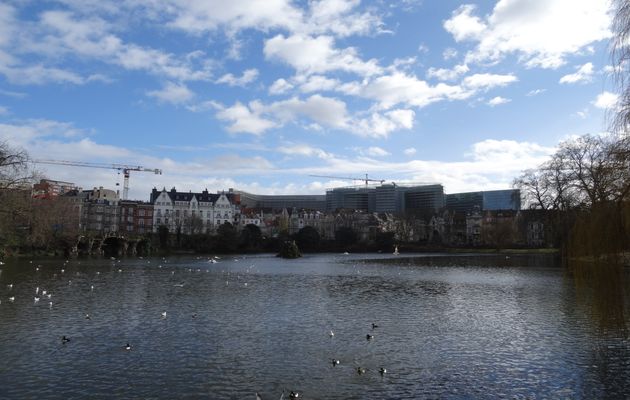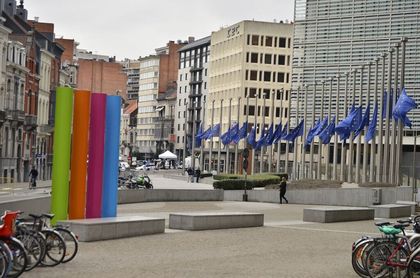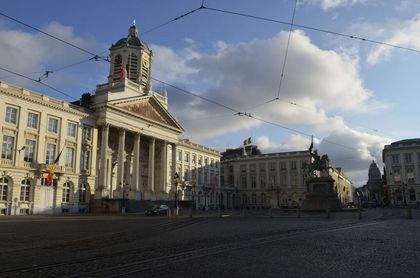The people of the “capital of Europe”, natives and European workers are mourning separately because they do not speak the same language and their frame of reference is different.
 View of the Berlaymont last year, the most important building of the European Commission, from Square Marie-Louise. In front, typical houses from Brussels.
View of the Berlaymont last year, the most important building of the European Commission, from Square Marie-Louise. In front, typical houses from Brussels.
Brussels has the pride and the pain of being both the capital of Europe and of Belgium. It is like two sides of a coin that never meet. They are the same; they share weal and woe but on no account they really look at each other in the eye.
For the good and the bad, Brussels has been destined to live yet another (consented) invasion. Do not misunderstand me; I have written “for the good” on purpose.
Yet, in the midst of the tragedy, something seems not to be right; something does not click in the way the people of Brussels are mourning for the dead and the wounded in the blasts of the airport and the metro. The terrorists unquestionably targeted “Europe”, and this message has been clearly understood by the whole world. Nonetheless, the security forces and policemen were and are Belgian, and of course Brussels is in Belgium.
Brussels inhabitants, both Belgian and non-Belgian, are struggling to make sense of what has happened. They do it separately, because they do not speak the same language, and because their frames of reference and allegiances are different too. In his first press conference after the blasts, the Prime Minister Charles Michel’s address was for the Belgians. He did say “our country”, not “our Union”, and asked Belgians to be united. I wonder how many non-Belgians know his name.
Ik ben Brussel
Whenever we identify with something, we exclude others. This was the case with the attacks to the magazine Charlie Hebdo. Many people could not say “Je suis Charlie” because, even if they believed in freedom of expression, they could not identify with the disrespectful and irreverent way of using that right.
It was similar with the Paris attacks, where the French media focused on the Republic “values” taking for granted that everyone shared them. But maybe some could not sympathize with such a hardcore secularism which French laïcité represents.
 The 28 flags of the European Union at half mast representing the 28 member states / Joëlle Philippe
The 28 flags of the European Union at half mast representing the 28 member states / Joëlle PhilippeIn the case of Belgium, the question is still simpler: if “nous sommes Bruxelles”, which of the two Brussels are we talking about, the capital of Europe or the capital of Belgium? In Paris, it was about French society. In Brussels, we are talking about Europe. Here and now, Brussels is not comparable to Paris.
European security for Brussels?
The New York Times’ front page headline in Wednesday’s printed edition was “Brussels attacks shake European security”. Anyone that knows a little bit how the European Union works knows that “European security” –even in the current situation- is far from becoming a reality. In the meantime, Belgian security and government get all the “bashing” for the mistakes they may have made.
“Belgian bashing” is the act of criticizing the incoherencies of Belgium –I have to admit there are many-. It became trending topic after the Paris attacks to the point that some foreign media called the country a “failed state”. Thankfully enough, the former US ambassador to Belgium explained that the only “failure” was letting the media say that.
However, “this bashing” started much before. “Brussels, the city that just does not give a damn”: this is how a European communications expert titled his article last October. He, at least, gave some advice on how to improve the city. I twitted him that maybe Belgian government would improve the Schuman area (European neighborhood) if Eurocrats paid taxes for the infrastructures they used daily. “Agree!” he said.
A utopian subculture
There is quite some vocabulary to learn when you arrive in Brussels, but as soon as you get acquainted with the words, the big picture becomes pretty clear. Expressions like “Eurobubble”, “Eurocrats”, “Place Lux”, “EP pride” or “MEP” start sounding familiar. The one I prefer is “Expat” which is used to designate all those white, educated workers that we cannot possibly (I am being ironic) call “immigrants” because they are European.
Let’s be honest. It is quite difficult to get out of the European bubble: as privileged, rich immigrants, they get along well with each other, work long hours, fly home on weekends. How can they have time to learn French (or Dutch) or to discover the country they are going to live in for at least 4 or 5 years?
 Official buildings wuth the Belgium flag at half / Joëlle Philippe
Official buildings wuth the Belgium flag at half / Joëlle PhilippeThe paradox goes even further. Most of these expats are pretty “convinced Europeans”, that is, committed to the political project of the European Union that advocates for more integration. What they do not realize is that this ideal evolves in that highly-educated class who lives in the same “international” context. They can manage this Eurobubble-subculture where different nationalities coexist providing they share the same beliefs, culture and habits.
Feet to the ground, what kind of Europe are they dreaming of? How can they talk of a more integrated Union when they do not integrate in the country that has welcomed them?
Those kind “manneken”
What do Belgians think of this? It is hard to tell for Wallonia and Flemish regions. For twenty years now, the people of Brussels have seen a city grow into a never-ending construction site. In 2004 and 2007, with the inclusion of the Eastern European countries to the Union, a new wave of foreign workers arrived. These workers speak much less French than the Western Europeans. Who could blame them? History did not help that. English has become the second language of Brussels.
Of course, European workers bring money and jobs. Belgians do not feel entitled to protest. So they have just resigned themselves to accepting the city’s changes, as they have done for centuries. They are used to the insignificance of their country.
The French comedian Dany Boon said that “Belgians invented kindness”. It is probably not accurate, because Belgium exists only since 1830 and kindness could be found before, but there is some truth in the line. The people of Brussels have this artlessness and good nature, and they have learnt or at least tried –really- to speak English.
But at the end of the day, their sense of humor we see online is charming. The Manneken Pis is ridiculously small, but so funny. Fries, beer and chocolate are delicious enough when shared with expats. How much more do we need to know to be able to mourn together?

Las opiniones vertidas por nuestros colaboradores se realizan a nivel personal, pudiendo coincidir o no con la postura de la dirección de Protestante Digital.
Si quieres comentar o